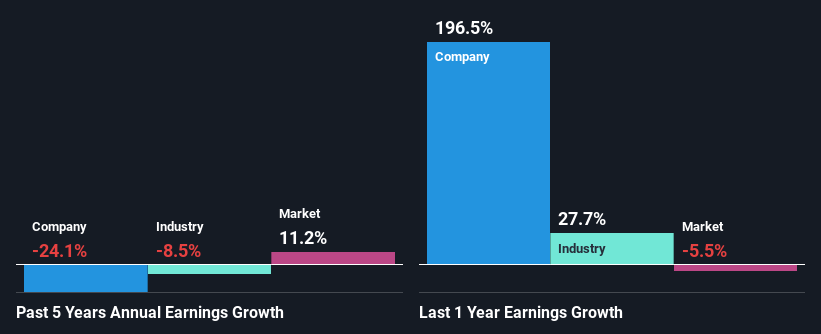Are Poor Financial Prospects Dragging Down Genting Singapore Limited (SGX:G13 Stock?
With its stock down 9.1% over the past three months, it is easy to disregard Genting Singapore (SGX:G13). We decided to study the company's financials to determine if the downtrend will continue as the long-term performance of a company usually dictates market outcomes. In this article, we decided to focus on Genting Singapore's ROE.
Return on equity or ROE is a key measure used to assess how efficiently a company's management is utilizing the company's capital. In simpler terms, it measures the profitability of a company in relation to shareholder's equity.
View our latest analysis for Genting Singapore
How Is ROE Calculated?
ROE can be calculated by using the formula:
Return on Equity = Net Profit (from continuing operations) ÷ Shareholders' Equity
So, based on the above formula, the ROE for Genting Singapore is:
6.6% = S$532m ÷ S$8.0b (Based on the trailing twelve months to June 2023).
The 'return' refers to a company's earnings over the last year. So, this means that for every SGD1 of its shareholder's investments, the company generates a profit of SGD0.07.
What Has ROE Got To Do With Earnings Growth?
We have already established that ROE serves as an efficient profit-generating gauge for a company's future earnings. We now need to evaluate how much profit the company reinvests or "retains" for future growth which then gives us an idea about the growth potential of the company. Assuming all else is equal, companies that have both a higher return on equity and higher profit retention are usually the ones that have a higher growth rate when compared to companies that don't have the same features.
Genting Singapore's Earnings Growth And 6.6% ROE
When you first look at it, Genting Singapore's ROE doesn't look that attractive. However, given that the company's ROE is similar to the average industry ROE of 6.6%, we may spare it some thought. But Genting Singapore saw a five year net income decline of 24% over the past five years. Remember, the company's ROE is a bit low to begin with. Therefore, the decline in earnings could also be the result of this.
Next, when we compared with the industry, which has shrunk its earnings at a rate of 8.5% in the same 5-year period, we still found Genting Singapore's performance to be quite bleak, because the company has been shrinking its earnings faster than the industry.
Earnings growth is an important metric to consider when valuing a stock. What investors need to determine next is if the expected earnings growth, or the lack of it, is already built into the share price. This then helps them determine if the stock is placed for a bright or bleak future. Is Genting Singapore fairly valued compared to other companies? These 3 valuation measures might help you decide.
Is Genting Singapore Efficiently Re-investing Its Profits?
With a high three-year median payout ratio of 100% (implying that 0.3% of the profits are retained), most of Genting Singapore's profits are being paid to shareholders, which explains the company's shrinking earnings. With only a little being reinvested into the business, earnings growth would obviously be low or non-existent.
Additionally, Genting Singapore has paid dividends over a period of at least ten years, which means that the company's management is determined to pay dividends even if it means little to no earnings growth. Existing analyst estimates suggest that the company's future payout ratio is expected to drop to 67% over the next three years. As a result, the expected drop in Genting Singapore's payout ratio explains the anticipated rise in the company's future ROE to 8.1%, over the same period.
Summary
Overall, we would be extremely cautious before making any decision on Genting Singapore. Particularly, its ROE is a huge disappointment, not to mention its lack of proper reinvestment into the business. As a result its earnings growth has also been quite disappointing. With that said, we studied the latest analyst forecasts and found that while the company has shrunk its earnings in the past, analysts expect its earnings to grow in the future. To know more about the latest analysts predictions for the company, check out this visualization of analyst forecasts for the company.
Have feedback on this article? Concerned about the content? Get in touch with us directly. Alternatively, email editorial-team (at) simplywallst.com.
This article by Simply Wall St is general in nature. We provide commentary based on historical data and analyst forecasts only using an unbiased methodology and our articles are not intended to be financial advice. It does not constitute a recommendation to buy or sell any stock, and does not take account of your objectives, or your financial situation. We aim to bring you long-term focused analysis driven by fundamental data. Note that our analysis may not factor in the latest price-sensitive company announcements or qualitative material. Simply Wall St has no position in any stocks mentioned.

